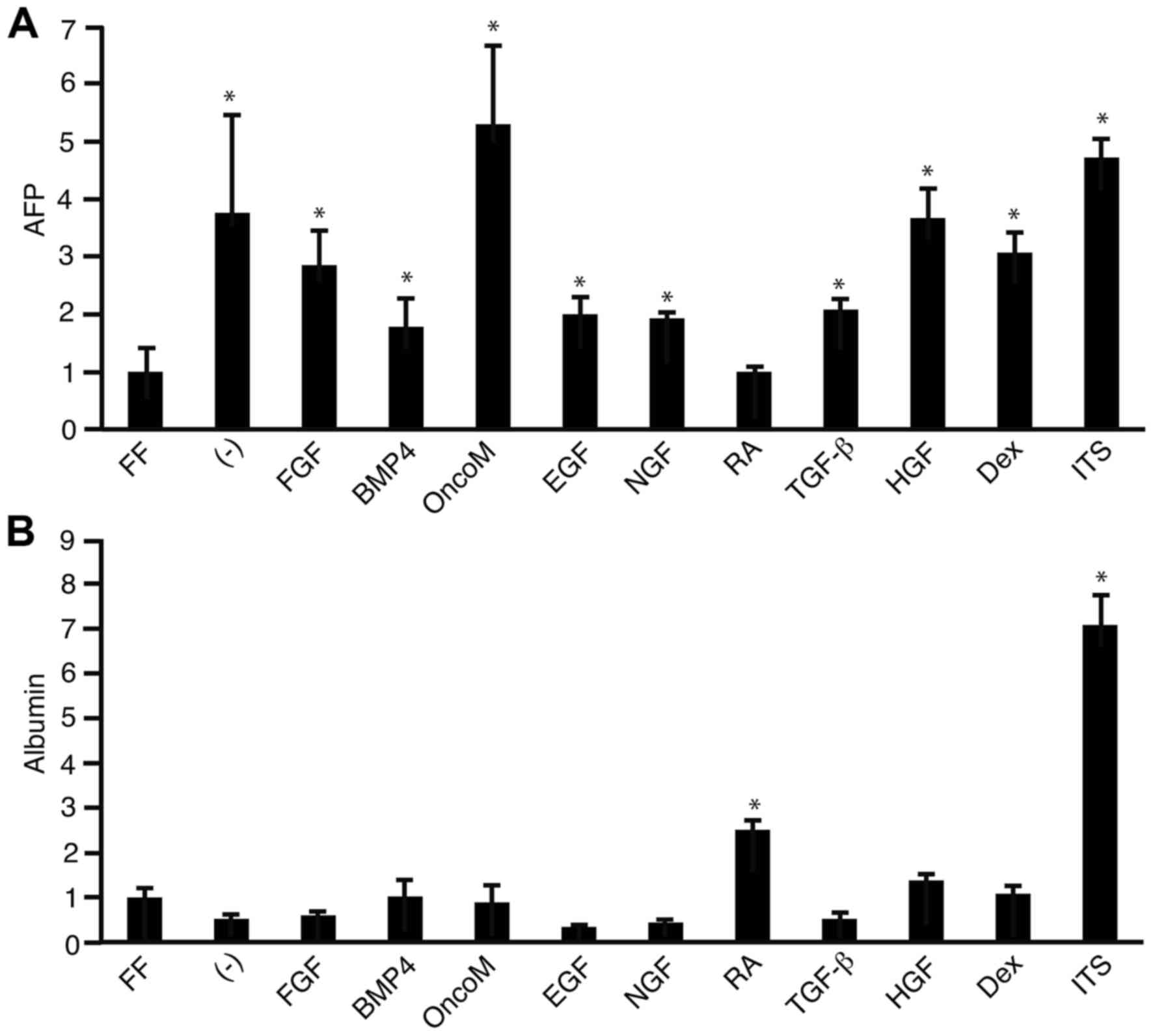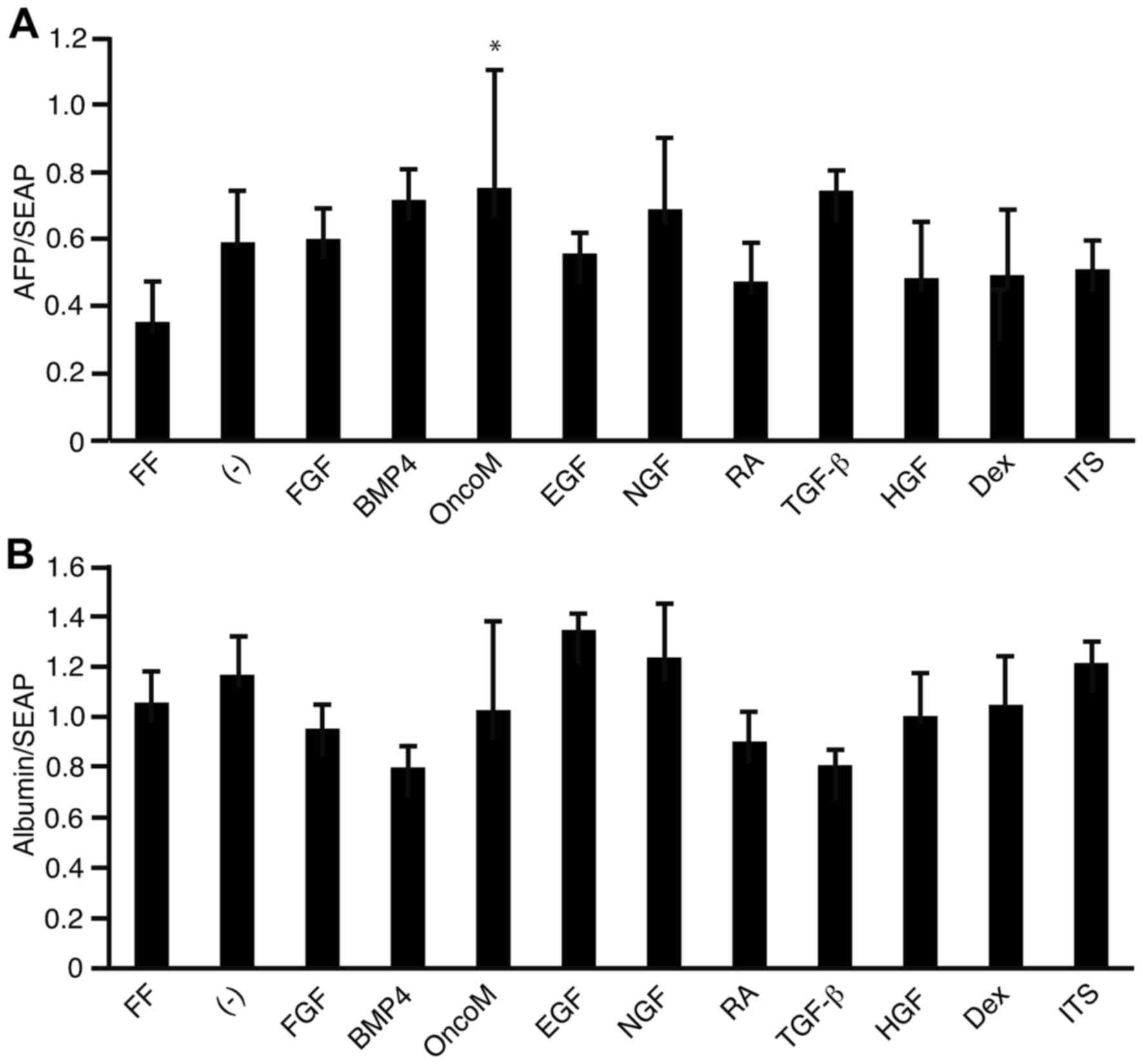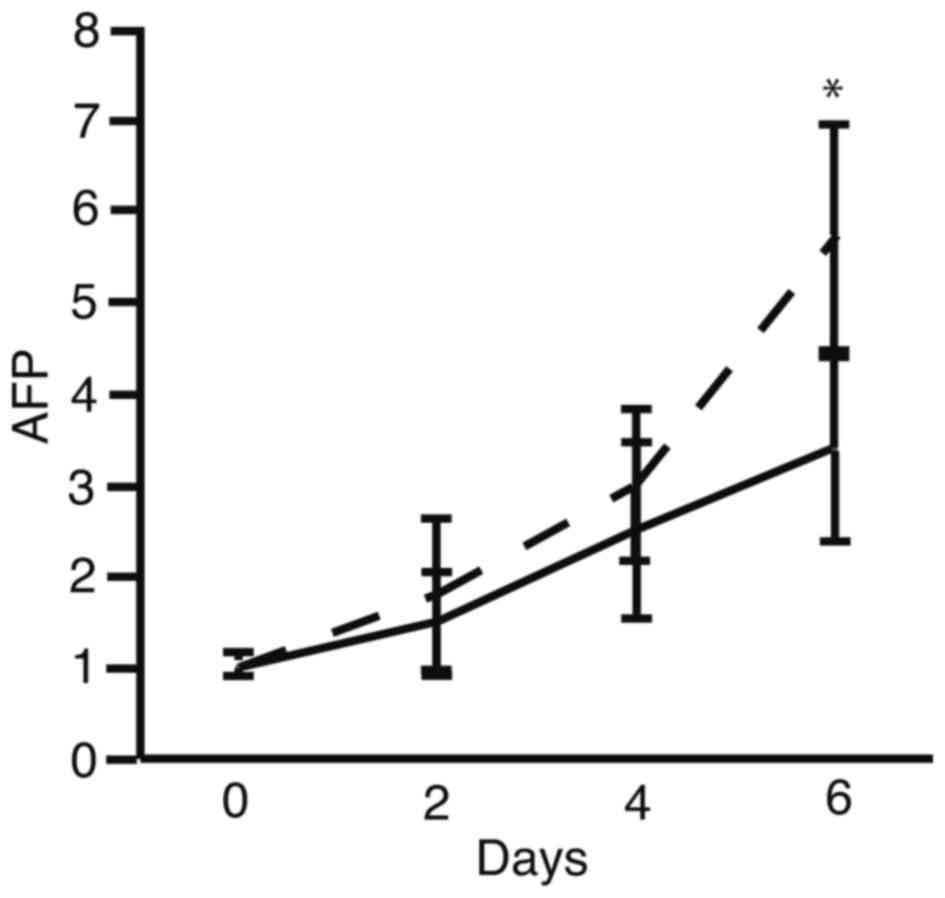|
1
|
Takahashi K, Tanabe K, Ohnuki M, Narita M,
Ichisaka T, Tomoda K and Yamanaka S: Induction of pluripotent stem
cells from adult human fibroblasts by defined factors. Cell.
131:861–872. 2007. View Article : Google Scholar : PubMed/NCBI
|
|
2
|
Takayama K, Inamura M, Kawabata K,
Sugawara M, Kikuchi K, Higuchi M, Nagamoto Y, Watanabe H, Tashiro
K, Sakurai F, et al: Generation of metabolically functioning
hepatocytes from human pluripotent stem cells by FOXA2 and HNF1α
transduction. J Hepatol. 57:628–636. 2012. View Article : Google Scholar : PubMed/NCBI
|
|
3
|
Takayama K, Inamura M, Kawabata K,
Katayama K, Higuchi M, Tashiro K, Nonaka A, Sakurai F, Hayakawa T,
Furue Kusuda M and Mizuguchi H: Efficient generation of functional
hepatocytes from human embryonic stem cells and induced pluripotent
stem cells by HNF4α transduction. Mol Ther. 20:127–137. 2012.
View Article : Google Scholar
|
|
4
|
Basma H, Soto-Gutiérrez A, Yannam GR, Liu
L, Ito R, Yamamoto T, Ellis E, Carson SD, Sato S, Chen Y, et al:
Differentiation and transplantation of human embryonic stem
cell-derived hepatocytes. Gastroenterology. 136:990–999. 2009.
View Article : Google Scholar : PubMed/NCBI
|
|
5
|
Tomizawa M, Shinozaki F, Sugiyama T,
Yamamoto S, Sueishi M and Yoshida T: Single-step protocol for the
differentiation of human-induced pluripotent stem cells into
hepatic progenitor-like cells. Biomed Rep. 1:18–22. 2013.PubMed/NCBI
|
|
6
|
Inamura M, Kawabata K, Takayama K, Tashiro
K, Sakurai F, Katayama K, Toyoda M, Akutsu H, Miyagawa Y, Okita H,
et al: Efficient generation of hepatoblasts from human ES cells and
iPS cells by transient overexpression of homeobox gene HEX. Mol
Ther. 19:400–407. 2011. View Article : Google Scholar : PubMed/NCBI
|
|
7
|
Tanaka A, Woltjen K, Miyake K, Hotta A,
Ikeya M, Yamamoto T, Nishino T, Shoji E, Sehara-Fujisawa A, Manabe
Y, et al: Efficient and reproducible myogenic differentiation from
human iPS cells: Prospects for modeling Miyoshi Myopathy in vitro.
PLoS One. 8:e615402013. View Article : Google Scholar : PubMed/NCBI
|
|
8
|
Tomizawa M, Shinozaki F, Motoyoshi Y,
Sugiyama T, Yamamoto S and Sueishi M: Dual gene expression in
embryoid bodies derived from human induced pluripotent stem cells
using episomal vectors. Tissue Eng Part A. 20:3154–3162. 2014.
View Article : Google Scholar : PubMed/NCBI
|
|
9
|
Tomizawa M, Shinozaki F, Motoyoshi Y,
Sugiyama T, Yamamoto S and Ishige N: Improved survival and
initiation of differentiation of human induced pluripotent stem
cells to hepatocyte-like cells upon culture in William's E medium
followed by hepatocyte differentiation inducer treatment. PLoS One.
11:e01534352016. View Article : Google Scholar : PubMed/NCBI
|
|
10
|
Wu D, Ramin SA and Cederbaum AI: Effect of
pyridine on the expression of cytochrome P450 isozymes in primary
rat hepatocyte culture. Mol Cell Biochem. 173:103–111. 1997.
View Article : Google Scholar : PubMed/NCBI
|
|
11
|
Takeba Y, Matsumoto N, Takenoshita-Nakaya
S, Harimoto Y, Kumai T, Kinoshita Y, Nakano H, Ohtsubo T and
Kobayashi S: Comparative study of culture conditions for
maintaining CYP3A4 and ATP-binding cassette transporters activity
in primary cultured human hepatocytes. J Pharmacol Sci.
115:516–524. 2011. View Article : Google Scholar : PubMed/NCBI
|
|
12
|
Kamiya A, Kojima N, Kinoshita T, Sakai Y
and Miyaijma A: Maturation of fetal hepatocytes in vitro by
extracellular matrices and oncostatin M: induction of tryptophan
oxygenase. Hepatology. 35:1351–1359. 2002. View Article : Google Scholar : PubMed/NCBI
|
|
13
|
Kamiya A, Kinoshita T, Ito Y, Matsui T,
Morikawa Y, Senba E, Nakashima K, Taga T, Yoshida K, Kishimoto T
and Miyajima A: Fetal liver development requires a paracrine action
of oncostatin M through the gp130 signal transducer. EMBO J.
18:2127–2136. 1999. View Article : Google Scholar : PubMed/NCBI
|
|
14
|
Davies B and Fried M: The L19 ribosomal
protein gene (RPL19): Gene organization, chromosomal mapping and
novel promoter region. Genomics. 25:372–380. 1995. View Article : Google Scholar : PubMed/NCBI
|
|
15
|
Tam S, Clavijo A, Engelhard EK and
Thurmond MC: Fluorescence-based multiplex real-time RT-PCR arrays
for the detection and serotype determination of foot-and-mouth
disease virus. J Virol Methods. 161:183–191. 2009. View Article : Google Scholar : PubMed/NCBI
|
|
16
|
Urbańska-Ryś H, Wiersbowska A, Stepień H
and Robak T: Relationship between circulating interleukin-10
(IL-10) with interleukin-6 (IL-6) type cytokines (IL-6,
interleukin-11 (IL-11), oncostatin M (OSM)) and soluble
interleukin-6 (IL-6) receptor (sIL-6R) in patients with multiple
myeloma. Eur Cytokine Netw. 11:443–451. 2000.PubMed/NCBI
|
|
17
|
Kinoshita T, Sekiguchi T, Xu MJ, Ito Y,
Kamiya A, Tsuji K, Nakahata T and Miyajima A: Hepatic
differentiation induced by oncostatin M attenuates fetal liver
hematopoiesis. Proc Natl Acad Sci USA. 96:7265–7270. 1999.
View Article : Google Scholar : PubMed/NCBI
|
|
18
|
Ye JS, Su XS, Stoltz JF, de Isla N and
Zhang L: Signalling pathways involved in the process of mesenchymal
stem cells differentiating into hepatocytes. Cell Prolif.
48:157–165. 2015. View Article : Google Scholar : PubMed/NCBI
|
|
19
|
Levy G, Bomze D, Heinz S, Ramachandran SD,
Noerenberg A, Cohen M, Shibolet O, Sklan E, Braspenning J and
Nahmias Y: Long-term culture and expansion of primary human
hepatocytes. Nat Biotechnol. 33:1264–1271. 2015. View Article : Google Scholar : PubMed/NCBI
|
|
20
|
Tomizawa M, Shinozaki F, Motoyoshi Y,
Sugiyama T, Yamamoto S and Ishige N: An optimal medium
supplementation regimen for initiation of hepatocyte
differentiation in human induced pluripotent stem cells. J Cell
Biochem. 116:1479–1489. 2015. View Article : Google Scholar : PubMed/NCBI
|
|
21
|
Kondo Y, Iwao T, Nakamura K, Sasaki T,
Takahashi S, Kamada N, Matsubara T, Gonzalez FJ, Akutsu H, Miyagawa
Y, et al: An efficient method for differentiation of human induced
pluripotent stem cells into hepatocyte-like cells retaining drug
metabolizing activity. Drug Metab Pharmacokinet. 29:237–243. 2014.
View Article : Google Scholar : PubMed/NCBI
|
|
22
|
Tomizawa M, Toyama Y, Ito C, Toshimori K,
Iwase K, Takiguchi M, Saisho H and Yokosuka O: Hepatoblast-like
cells enriched from mouse embryonic stem cells in medium without
glucose, pyruvate, arginine and tyrosine. Cell Tissue Res.
333:17–27. 2008. View Article : Google Scholar : PubMed/NCBI
|
|
23
|
Tomizawa M, Shinozaki F, Sugiyama T,
Yamamoto S, Sueishi M and Yoshida T: Survival of primary human
hepatocytes and death of induced pluripotent stem cells in media
lacking glucose and arginine. PLoS One. 8:e718972013. View Article : Google Scholar : PubMed/NCBI
|

















